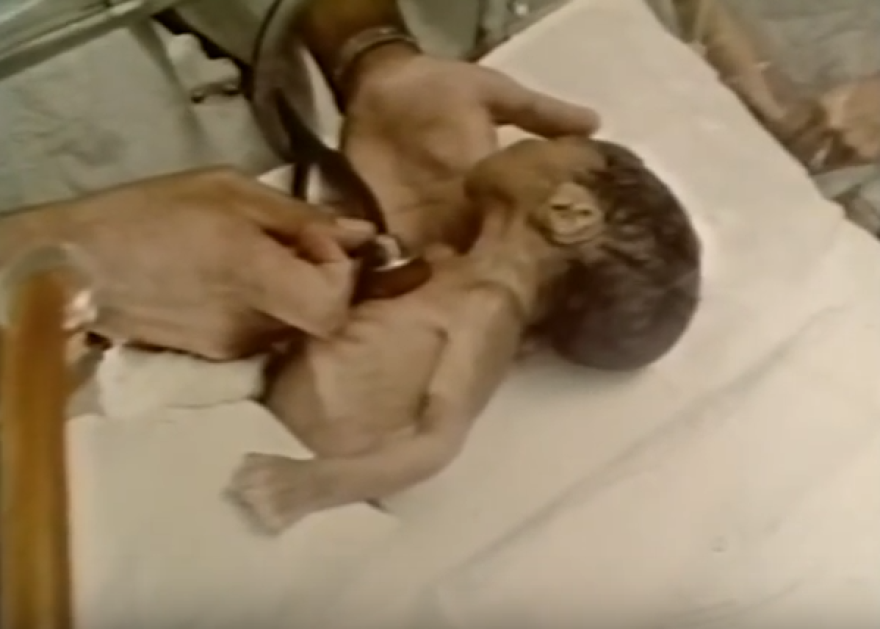It was 50 years ago that a documentary exposed the conditions on the San Antonio Westside that shocked the nation.
America saw disturbing images of extreme poverty and malnutrition that was common in San Antonio.
Half a century later the CBS program “Hunger in America” continues to resonate in San Antonio.
“San Antonio, Texas is celebrating its 250th birthday with an international exposition, HemisFair '68. There’s a skyride, a monorail and, of course, the usual 600 foot tower with a revolving restaurant on top,” intones CBS news reporter Charles Kuralt in the film.

In 1968, San Antonio was on a mission to reintroduce itself as a city of the future using HemisFair. But when Kuralt and his team came to San Antonio, they focused on the city’s extreme poverty. He found it in the neighborhoods not far from the celebration of HemisFair.
“Where 400,000 Mexican-Americans live. Most of them are crowded into what city officials call 'poverty tracks.' A quarter of San Antonio’s Mexican-Americans, 100,000 people are hungry all the time,” Kuralt reported.
“Hunger in America” also looked at three other high poverty areas in the nation: African American Sharecroppers in Alabama, Navajos in Arizona and tenant farmers in Virginia. But the report gave special attention to San Antonio.
It opened with images of a baby suffering from malnutrition at the county’s Robert B. Green Hospital.
“This baby is dying of starvation. He was an American. Now, he’s dead,” Kuralt reported.
Also featured was local priest Ralph Ruiz. Now, 50 years later, Ruiz is 82 years old.
He flips through a thick scrapbook filled with newspaper clippings, some attacking him for his efforts to help the city’s poor.
He remembers the local leaders reacting angrily.
“Politicians were mad,” he said.
WATCH | Full documentary of 'Hungry In America'
They tried to keep the documentary from being seen in San Antonio.
“When it was going to be shown that day, San Antonio didn’t show it. But then the reports came out the following day about 'Hunger in America' and it featured San Antonio, all kind of hell broke loose," he said. "They wanted to see it. So that put pressure on the structure here and show the documentary at eleven o’clock at night the following day.”
Bexar County Commissioner A. J. Plouch was one of CBS’s loudest critics. He had been interviewed in the documentary about the local problem of poverty and hunger.
“Well, why are they not getting enough food? Because the father won’t work. And I mean won’t work," he said.
A reporter asked, "I wonder if these children who are not getting a proper diet are going to be able to learn properly in school.”
He replied: “Well, what do you mean? Not learn properly in school? Do you really need school?”
Ruiz thought Plouch’s comments were racist, hateful and inappropriate.
“It was such an obvious distain, racist against the Mexican-Americans. It was so obvious,” he said.

But in 1968, this is what the most local leaders thought, he said.
“Yes, he was a racist. And he was a mirror of so many in San Antonio who thought the same way he did. And acted the same way and didn’t give a damn the same way he did,” Ruiz said.
The ramifications were nationwide, said Robert Greenstein, president and founder of the Center on Budget and Policy Priorities.
“It led one of the viewers, South Dakota Senator George McGovern, to go to the senate floor the very next day and offer a resolution that passed a new senate committee to look into and learn more about hunger and malnutrition in the U.S,” he said.
That committee launched the federal school lunch program, food stamps and other anti-hunger programs.
But Plouch and other local leaders, including Congressman Henry B. Gonzalez, continued to attack the documentary as inaccurate and fake. The commissioners voted to instruct the district attorney to determine if a lawsuit can be filed to “stop CBS from spreading lies throughout the world.”
Instead, the CBS documentary "Hunger in America" was awarded a Peabody Award.
David Martin Davies can be reached at dmdavies@tpr.org or on Twitter @DavidMartinDavi



